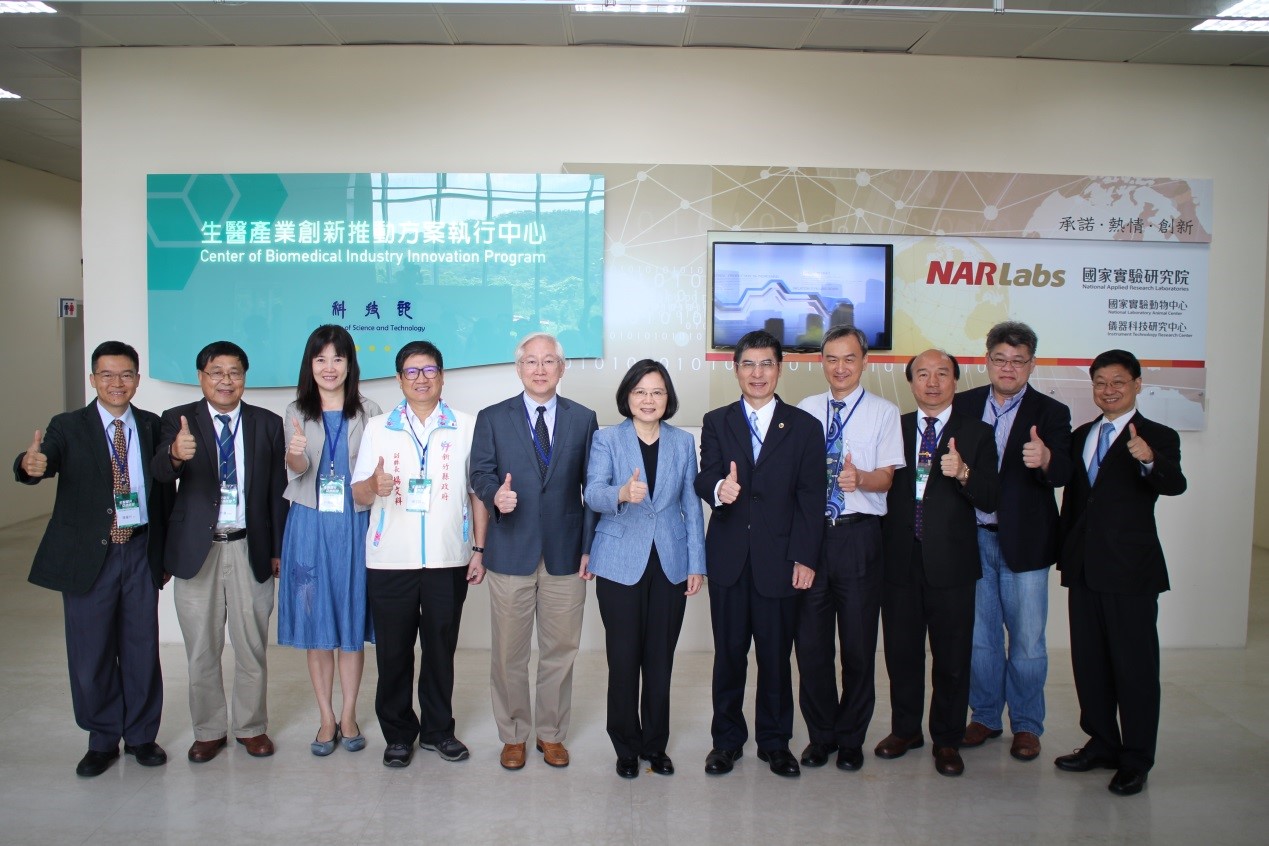Taiwanese Biomedical Research Teams Shone Through in BIO Asia International Conference
President Tsai Visited the Implementation Center for the “Biomedical Industry Innovation Program”

President Tsai visited the Biomedical Technology and Product Research Center in Hsinchu Biomedical Science Park on June 26, 2017, and was briefed on the progress of the “Biomedical Industry Innovation Program” and the research results achieved by the R&D team of the Center.
The “Biomedical Industry Innovation Program” was initiated by the Board of Science and Technology (BOST) in July 2016 in response to the government’s policy on the development of the biomedical industry. The BOST appointed the Ministry of Science and Technology (MOST) to lead the program with assistance from relevant ministries and government agencies, including the Ministry of Economic Affairs (MOEA), Ministry of Health and Welfare (MOHW), National Development Council (NDC), etc. The Program contains four action plans: building a comprehensive ecosystem, integrating innovation clusters, connecting to global markets and promoting key industry sectors. The Program aims to create local, global and future links, as well as to collaborate with the industry and the academia to jointly promote Taiwan as the biomedical R&D hub.
Guided by the Program, the MOST invited international experts to form the “Biomedical Development Board (BDB)” with a view to applying international business’s cutting-edge thinking to the promotion of the biomedical industry for breakthrough improvement. By providing trainings for present and future start-up CEOs, organizing seed funds, linking angel investors with start-ups and creating the “Biomedical i-Hub (BIH)”, the BDB plays the role of the industrial propeller to drive the biomedical industry to achieve innovations.
Since the implementation of the Program, the government has completed the amendment of the “Act for The Development of Biotech and New Pharmaceuticals Industry”, broadened the definition of high risk medical devices, and selected new emerging biomedical items for strategic development, including precision medicine, gene therapies, cell therapies and Paragraph IV drugs. The Legislative Yuan also passed the amendment of the “Fundamental Science and Technology Act” to accelerate the partnership between the industry and the academia and speed up the commercialization of academic research results. Together, these efforts build up new momentum for the biomedical industry in Taiwan.
In the aspect of market expansion and the development of new products, the MOEA formed the “Taiwan Pharmaceutical Alliance” to lead the pharmaceutical market expansion. It has already forged a partnership with pharmaceutical groups in Japan.
Targeting southbound, the Taiwanese government has been keen to share the successful experiences in disease prevention with Southeast Asian countries. For example, the government passed onto those countries the hands-on knowledge about the deployment of various disease prevention technologies, such as rapid diagnostic tests, mosquito controls, geographic information, drones, etc., to effectively contain the spread of local dengue infection. Meanwhile, the MOHW remains actively engaged in expanding the medical device markets in Southeast Asia. For example, the MOHW invited medical leaders from Thailand, Philippines, Indonesia and Malaysia to visit Taiwan to experience the state-of-the-art treatments using dental materials manufactured in Taiwan, and attracted doctors from that region to learn new medical techniques in Taiwan with a view to promoting the export of medical devices and materials.
As for the integration of innovation clusters, the National Biotechnology Research Park in Nangang District of Taipei will be completed this year, creating a new innovative drug and medical device R&D cluster. The National Taiwan University Hospital plans to open a branch in Hsinchu Biomedical Science Park. The construction work has already started. After its completion, it will be a base for clinical translational researches.
The changes in demographic and industrial structures create new market opportunities for the pharmaceutical, medical device and healthcare industries. Taiwan has the advantages of an excellent healthcare system, high quality pharmaceutical products (PIC/S GMP compliance), a strong ICT industry and a solid foundation of precision machinery manufacturing. These advantages will jointly open up new opportunities for the biomedical industry in Taiwan. The implementation of the “Biomedical Industry Innovation Program” will further enhance the industry’s innovative capacity and efficiency. The Program will also integrate the innovation clusters and resources to help the industry to expand southbound and into global markets.